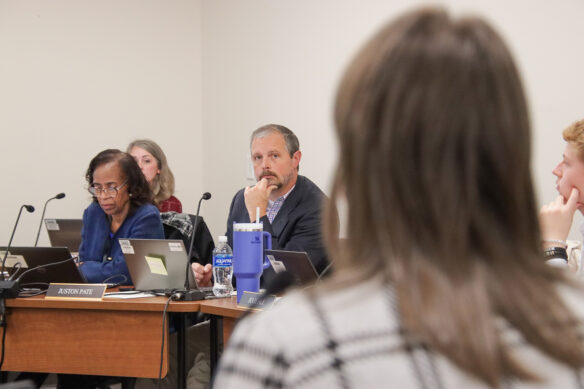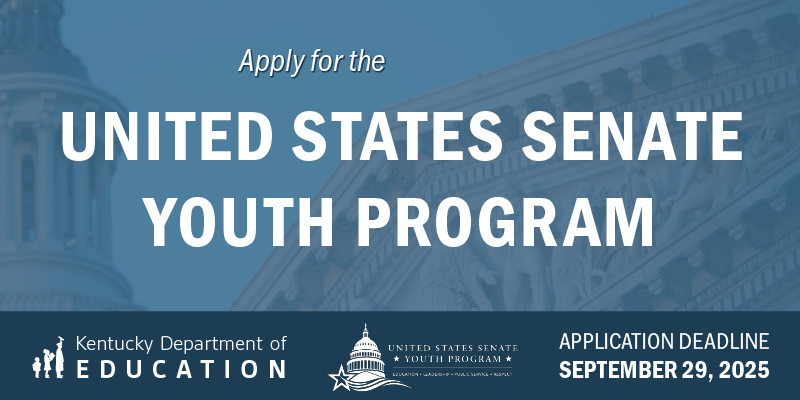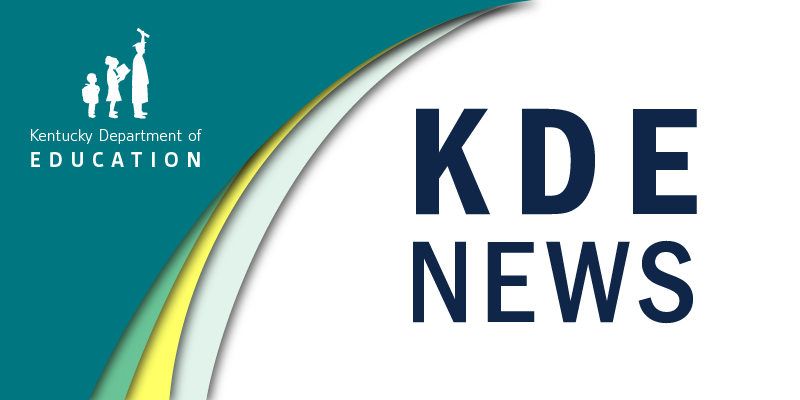
Kentucky Board of Education members Diana Woods, from left, and Juston Pate listen to Jennifer Stafford, director of the Kentucky Department of Education’s Division of Assessment and Accountability Support, as she presents the latest information on assessment and accountability. Photo by Joe Ragusa, Kentucky Department of Education, Dec. 4, 2024
The Kentucky Board of Education (KBE) discussed the latest developments in the Kentucky Department of Education’s (KDE’s) and the Kentucky United We Learn Council’s efforts to revamp the Commonwealth’s assessment and accountability systems during its meeting Dec. 4-5.
Jennifer Stafford, division director for KDE’s Office of Assessment and Accountability, provided an update and reviewed the development process, core values and the proposed phased-in approach for implementation.
“We’ve had several prototypes that we’ve been working with and developing over the summer, and those prototypes have evolved into a framework,” she said. “We have something on paper that we can respond to, taking into consideration all of the study that was conducted and all of the feedback that we received.”
She also highlighted how the latest proposal, Framework 1.0, incorporates a distinct separation of the required federal accountability indicators that are used to identify the lowest-performing schools, from other components that could be included in each district’s local accountability reporting.
Board member Mike Borchers said he would like to see an accountability system that continues to test and assess science performance, but moves it from a federal school quality measure to a local one. Previous prototypes included science performance as an item reported to the federal government.
Several board members expressed interest in moving science performance to a local school quality measure as well.
“I am convinced that Kentucky will continue to improve on student performance in (Next Generation) Science Standards, but there’s no reason for us to shackle ourselves with additional federal accountability when we can handle it at the state and local level,” KBE Vice Chair Lu S. Young said.
Board member Randy Poe said moving science performance to a local school quality measure instead of a federal one could keep schools from having to enter federal monitoring when they’re still succeeding in other science-related measures such as Advanced Placement, dual credit and students entering advanced science areas at the postsecondary levels.
Commissioner of Education Robbie Fletcher said the new framework includes flexibility for districts to develop their own local accountability measure, opening the door for groups of districts to work together to implement ideas that make sense for their communities.
Board member Juston Pate said he likes the idea of giving districts local flexibility with assessment and accountability.
KDE staff members are currently organizing a series of town halls across the state to get input from educators, students, families, legislators and community members on the framework and how new assessment and accountability systems could work locally. Fletcher said there will be a revised Framework 2.0 before those town hall meetings for the public to review.
“This is a very exciting time in education as we move forward with these assessment and accountability models,” Fletcher said.
Assessment and Accountability Data for 2023-2024
KBE members discussed 2023-2024 assessment and accountability data, which was released on Oct. 3.
Rhonda Sims, associate commissioner in the KDE Office of Assessment and Accountability, shared a statewide look at how students performed on assessments, including highlights and areas where the Commonwealth has room to grow.
Sims singled out science assessments as a key area of concern for the department. The rate of students testing at a proficient or distinguished level in science was lower across all grade levels than any other content area, continuing a multi-year trend.
The current science assessment has been in place since the 2018-2019 school year. Sims said the new Kentucky Academic Standards (KAS) for Science were approved by the KBE in December 2022 and officially incorporated into law in 2023. Once the new standards were adopted, KDE began facilitating with Kentucky teachers the development of items to refresh the assessment. Sims said students will start seeing the updates in spring 2025, a full year before they originally were scheduled to be used.
Several board members said they wanted to ensure the science assessment is still challenging for students.
“What I see in these redesign efforts help us find that spot where we’re not just blaming the test, nor are we blaming the kids, nor are we blaming the teachers,” Young said. “But instead, we’re trying to bring those things together: Better teacher preparation around science, better engagement on the part of kids around science and a test that better reflects what’s going on in the instructional model.”
Sims also mentioned multiple efforts KDE is undertaking to address nonacademic factors that could be impacting student performance, including a campaign this year to raise awareness about chronic absenteeism and a planned public messaging campaign in 2025 to address Kentucky’s teacher shortage.
Micki Ray Marinelli, KDE’s chief academic officer, discussed other efforts to bolster instruction in the classroom, including hosting professional learning opportunities for Kentucky teachers and administrators and promoting high-quality instructional resources for science, mathematics, reading and writing instruction.
Online, Virtual and Remote Learning Program Regulations
KBE members approved an agency amendment to 704 KAR 3:535 regarding full-time enrolled online, virtual and remote learning programs.
The amendment follows actions taken by the KBE during its meeting in August related to these programs. During that meeting, board members approved amendments to state regulations requiring students enrolled in these programs to be primarily enrolled in an accountable school and their accountability to be attributable to that school in accordance with other accountability guidelines.
The additional amendment would, starting with the 2025-2026 school year, prohibit a district from enrolling more students in a full-time enrolled online, virtual and remote learning program than 10% of the total student enrollment in the district on Oct. 1 of the previous school year.
Certification of Nonpublic Schools
Board members approved a new regulation on the certification of nonpublic schools.
Associate Commissioner Kelly Foster and Policy Advisor Matthew Courtney, both in the KDE Office of Continuous Improvement and Support, reviewed the four different sections of the new regulation, 704 KAR 3:315.
Section two of the regulation provides the procedures for certification, which includes:
- The non-public school must seek accreditation from an approved accreditor;
- The non-public school must apply for voluntary certification through the KyNPSC;
- The KyNPSC annually produces a list of non-public schools for consideration by the KBE;
- Upon the recommendation of the KyNPSC, the KBE may revoke certification at any point during the school year.
Foster said that section three of the regulation will be KyNPSC required policies, which includes KyNPSC adopting a policy for the screening and selection of eligible accrediting agencies, a policy for recommending non-public schools to the KBE for certification and recommending certification revocation.
In addition, KDE will provide technical assistance as requested by KyNPSC, and the commission will annually submit the three required policies to the KBE for review and approval.
Section four addresses the posting requirements from both KyNPSC and KDE. Both are required to post on their websites a list of certified non-public schools, which will include information like the names of the certified nonpublic schools, the grade levels served, a static email, approved accrediting agencies and the three required policies.
In other business, board members:
- Awarded the 2024 Kevin M. Noland/Mary Ann Miller Award for Outstanding Public Service to Kentucky Schools to Amy Patterson, a systems consultant/data manager in KDE’s Office of Special Education and Early Learning; and
- Approved a waiver request from the Hardin County Board of Education related to 702 KAR 4:050, traversing easements.




Leave A Comment